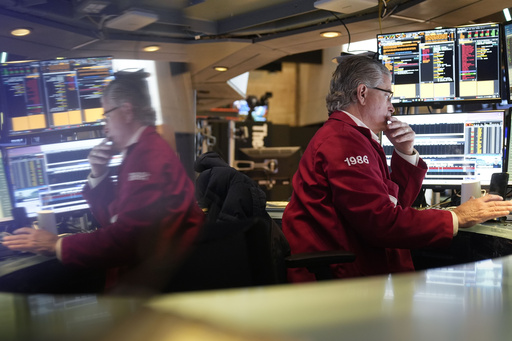NEW YORK — On Wednesday, major technology stocks, including Netflix and Oracle, provided a boost to Wall Street as their profits continue to increase, generating enthusiasm around the lucrative opportunities in artificial intelligence (AI).
The S&P 500 experienced a 0.6% rise, nearing its all-time closing high achieved earlier last month. The Dow Jones Industrial Average also made gains, adding 130 points, or 0.3%, while the Nasdaq composite surged by 1.3%.
These advancements occurred despite a broader downturn in U.S. stocks, which faced pressure from rising Treasury yields in the bond market. The Russell 2000 index, reflecting smaller stocks, declined by 0.6%, with approximately two-thirds of the S&P 500 companies experiencing losses. However, the positive performance of large, influential companies outweighed these setbacks.
Netflix spearheaded the rally after announcing a substantial increase in subscribers—nearly 19 million over the last quarter—thanks to live events like football games and a boxing match between Mike Tyson and Jake Paul. The streaming service also exceeded profit expectations and unveiled plans to raise subscription prices in the U.S. and select international markets, resulting in a 9.7% jump in its stock.
As Netflix joins a growing array of firms that have surpassed profit forecasts for the end of 2024, these favorable results bolster stock prices and mitigate the impact of climbing Treasury yields, which tend to lure investors away from equities.
The increase in yields, attributed to ongoing inflation concerns and the rising federal debt, had previously pressured stocks and momentarily interrupted their record-breaking progress in 2024.
Travelers Cos. saw a 3.2% gain after exceeding profit expectations for the latest quarter. The insurance company cited solid investment returns and growth in net written premiums as factors that helped it navigate losses from Hurricane Milton, which struck Florida’s Gulf coast in October, alongside other disasters.
Procter & Gamble shares rose by 1.9% after the producer of Charmin, Crest, and Pampers reported better-than-expected profit and revenue for the recent quarter. Despite facing challenges from rising commodity prices and a stronger dollar, the company reaffirmed its financial outlook for the fiscal year.
AI-related companies played an essential role in driving market upward momentum. Oracle saw its stock increase by 6.8%, building on a 7.2% rise the previous day. This surge came in anticipation of an announcement regarding Stargate, a joint venture aimed at establishing data centers and electricity generation to support AI development in Texas.
The partnership involving Oracle, OpenAI, and SoftBank is set to invest as much as $500 billion. SoftBank Group Corp. stock in Tokyo surged by 10.6%.
Other stocks linked to AI also saw gains, continuing their impressive trajectory. Nvidia, the chipmaker fueling much of the AI movement, rose by 4.4%, with its shares now over $147, a remarkable increase from below $18 just two years ago.
These advancements helped offset a 3.4% decline experienced by Textron. Despite reporting a better profit than analysts had anticipated in the most recent quarter, its revenue fell short of expectations. The company, known for manufacturing Bell helicopters and Cessna airplanes, also offered a profit forecast for the upcoming year that did not meet some analysts’ predictions.
Overall, the S&P 500 increased by 37.13 points, settling at 6,086.37. The Dow Jones Industrial Average rose by 130.92 points to reach 44,156.73, and the Nasdaq composite surged by 252.56 points to 20,009.34.
International stock markets exhibited mixed results across Europe and Asia.
In the bond market, the yield on the 10-year Treasury climbed to 4.60%, up from 4.57% observed late Tuesday. Although it had displayed some regression following positive inflation updates last week, the yield remains significantly higher than the sub-3.65% levels recorded in September.
Strategists from BlackRock Investment Institute anticipate that interest rates will remain elevated for an extended period due to factors such as an aging workforce and high government debt levels in the U.S.
“Investors are seeking greater compensation for the risk associated with holding long-term bonds, pushing the term premium to a decade-high,” remarked the strategists led by Jean Boivin.
To ensure stock market resilience despite the challenges posed by high interest rates, companies must continue to report solid profit growth, a trend that Boivin identifies as encouraging based on recent signals.
In the cryptocurrency sector, where prices have surged due to hopes for a more favorable regulatory environment under President Donald Trump, Bitcoin was trading just above $104,000, having set a record beyond $109,000 on Monday.
Nonetheless, some caution remains following the launch of meme coins by Trump and his wife, which faced criticism as potential cash grabs.
Copyright @2024 | USLive | Terms of Service | Privacy Policy | CA Notice of Collection | [privacy-do-not-sell-link]



